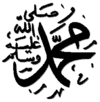- Naat
-
A series of articles on

Prophet of Islam
Muhammad
Life
In Mecca · Hijra · In Medina · Conquest of Mecca · Wives · Farewell pilgrimage · Family tree ·
Career
Qur'an · Hadith ·
Early reforms under Islam · Diplomacy · Military · Persecution by Meccans · Migration to Abyssinia ·
Miracles
Isra and Mi'raj · Relics · Splitting of the moon ·
Al-Masjid al-Nabawi ·
Views by subject
Jewish · Christian · Slavery ·
Succession
Farewell sermon · Saqifah · Pen and paper · Family · Companions · History ·
Praise
Durood · Na'at · Mawlid · Haḍra · Madih nabawi ·
Ya Muhammad ·
Perspectives
Islamic · Jewish · Bible · Medieval Christian · Historicity · Criticism · Prophetic biography · Depictions · Films · Depictions in film ·A Na`at (Arabic: نعت) is a poetry that specifically praises the Islamic prophet Muhammad. Many of the famous scholars in the earlier days of Islam wrote Naat. People who recite Naat are known as Naat-Khua'an or Sana'a-Khua'an.
Contents
History
It is difficult to trace the history of Na'at Khawani since no authenticated record of when it was initiated can be found. On a more regularized basis, Muhammad's companion Hassan ibn Thabit started this work. He was also known as Shair-e-Darbaar-e-Risalat. Even before accepting Islam he was a poet, but after embracing Islam he gave a new turn to his poetry and started writing Na'ats in honor of Muhammad.[1] He was famous for his poetry that defended Muhammad in response to rival poets that attacked him and his religion. Therefore Hassan is known as the first Sana-Khawaan (Naat reciter) of that time. After that many a poet followed this trend and totally dedicated themselves to writing Naats.
Islamic poetry is rich in the praise of Muhammad. Rarely has there been any Muslim poet who has not written about him. This is mainly inspired from the Islamic Hadith that each act of veneration will result in ten blessings of God on the person who venerates.[citation needed].
Language
Commonly the term Naat-Shareef (Exalted Poetry) is reserved and used for poetry in the praise of Muhammad written in Urdu, Turkish, Persian, Arabic and also in Punjabi.
In the Arabi language, Naat is usually referred as Madih (praise), or simply as Nasheed (poetry) or Anasheed (plural). The latter two terms can describe any type of religious poetry.
Anasheed or Naat usually is not accompanied by musical instruments. However some scholars have allowed the use of the daf (small drum). Usually poetry that is accompanied by musical instruments is called Ghinaa (music).
Excerpts
By Allama Iqbal:
In the Muslim's heart there is the Home for Muhammad All our glory is from the name of Muhammad
1.From Asrar-i-Khudi (edited slightly)
If you are loyal to Muhammad, then We are yours, This universe is nothing - The Tablet and Pen are yours.
2. From Jawab-i-Shikwah (edited slightly)
Sheikh Saadi:
- Gracious of disposition,
- Of elegant form (Muhammad)
- The Prophet of the people,
- The intercessor of nations
- The Prelate of Prophets,
- Leader in the path (Of Religion!)
- The Faithful of God, the place of descent of Gabriel[2]
Al-Busiri
- Muhammad, leader of the two worlds
- And of Man and the jinn,
- Leader also of the Arabs
- And non-Arabs and their kin,
- Our Prophet , Commander of Right,
- Prohibits evil's way[3]
from Qasida Burda edited slightly
Shah Abdul Lateef Bhitai
- Oh Moon, never mind if
- I tell you the truth
- Sometimes you are dim
- Sometimes you are bright
- Still, your brightness is not equal
- To an atom of the dust
- From the foot of Muhammad
See also
- Aamir Liaquat Hussain
- Alhaj Muhammad Owais Raza Qadri
- Junaid Jamshed
- Khursheed Ahmad
- Sabih Rehmani
- Arabic music
- Islamic music
- Sufi music
- Sufi poetry
References
Buddhist · Christian · Hindu · Jewish · Islamic · Native American · Taoist · Rastafarian · Shinto · Sikh · Zoroastrian
Urdu poetry Bait • Bait-ul-Ghazal • Beher • Diwan • Kulliyat • Husn-E-Matla • Kalam • Kulyat • Maqta • Matla • Mavra • Misra • Mushaira • Qaafiyaa • Radif • Sher • Shayar • Shayari • Tah-Tul-Lafz • Takhallus • Tarannum • Triveni • Doha • Fard • Geet • Ghazal • Hamd • Hazal • Hijv • Kafi • Madah • Manqabat • Marsia • Masnavi • Munajat • Musaddas • Mukhammas • Naat • Nazm • Noha • Qasida • Qat'ã • Qawwali • Rubai • Salam • Sehra • Shehr a'ashob • Soz • Wasokht • Tazkira • PoetsCategories:- Muhammad
- Islamic poetry
- Urdu poetry
- Islamic music
- Naat Khawans
Wikimedia Foundation. 2010.
